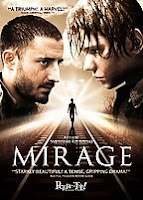Mirage: The Deadly Sin of Hope

"Hope is the worst of evils, for it prolongs the torment of man." (Friedrich Nietzsche, Human, All Too Human)Nietzsche's wisdom squares with that of the ancient Greeks. Aeschylus said hope was the "food of exiles", Euripedes thought it was humanity's greatest curse, and in Pandora's box it was ranked alongside the sins of greed, vanity, slander, envy, and pining. Hope was just as foolish to the Norse and Anglo-Saxons: evil would out at Ragnarok, and the best a warrior could hope for was to go down laughing in defeat. Tolkien's Middle-Earth evokes the pagan mindset: even after destroying the Ring, Frodo reminds Sam that "hopes fail" despite appearances. Hobbits rely on cheer instead of hope, expecting disaster from then start and so remaining immune, even cheerful, when their expectations are confirmed. I'm inclined to view hope as more sinful than virtuous, despite what the Judeo-Christian tradition teaches us -- and even if that puts us in the unpleasant company of Nietzsche.
Svetozar Ristovski's excellent film Mirage opens with the Nietzsche quote, promising something less uplifting than what usually comes out of Hollywood. It's about a Macedonian boy Marko, whose life is punctuated by poverty, family dysfunction, and abuse at school. His father is an alcoholic who rails against the American occupation, his mother a mouse, his older sister a vicious tramp, and his classmates horribly violent bullies. He finds some hope in his Bosnian teacher who patronizes him for his academic talents, encouraged to write a poem for a school competition which would award him a trip to Paris. He also finds escape along the railroad tracks where a hobo befriends him. But hopes are ultimately dashed: his teacher turns out to be hollow and ineffectual, unable to control the classroom bullies; and his homeless friend abandons him. Marko finds the strength to stand on his own only by turning to crime and violence.
Mirage paints a country ruined by occupation, poverty, and corruption, and forces the theme of hopelessness in ways that will leave many viewers nonplussed. The ending is certainly grim. But it's a must-see, for its excellent acting performances and effective cinematography, and because it makes you think about despair for the right reasons. Jesus lived in a country much like Marko's Macedonia. He found hope in the apocalyptic kingdom of God, where the last would be first and the first last. "Jesus was wrong," intones Dale Allison, "reality has taken no notice of his imagination. And yet despite everything, he says the only things worth saying, for his dream is the only dream worth dreaming" (Millenarian Prophet, pp 218-219). Perhaps. Hope keeps many of us sane, and self-deception is largely necessary for healthy living anyway. But Nietzsche had a good point too: dreams like Jesus' and Marko's can set us up for even more misery and do more harm than good. There's something to be said for the ancient pagan wisdom that since things must turn out badly in the end, they can only be better in the meantime -- or that life is good no matter how bad, because that's all there is.
Rating: 4 stars out of 5.

